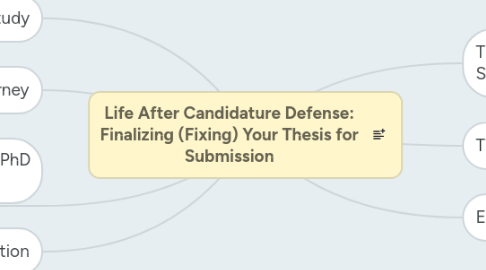
1. Creative Ways to Complete a PhD a.k.a Surivival Skills
1.1. My Story
1.2. Pockets of Time
1.3. Mobile Desk
1.4. Thesis Buddy
1.5. Thesis/PhD Coach
1.6. Motivation Kit
1.7. Life Goes On vs. Life On Hold
1.8. Mental & Physical Wellbeing
1.9. P
1.10. The UM PhD Journey
1.10.1. Proposal Defence
1.10.2. Candidature Defense
1.10.2.1. CD 1
1.10.2.2. Requirements
1.10.2.2.1. Findings (partial)
1.10.2.2.2. Everything before findings: Summary of Ch.1 - Ch.3
1.10.2.3. CD 2
1.10.3. Pre-Viva Presentation
1.10.4. Publicizing your Work in Progress (WIP)
1.10.4.1. National/International Conference
1.10.4.2. Publications
1.10.5. Viva
1.10.5.1. Viva 1
1.10.5.2. Viva 2
2. Thesis Structure: Social Science/Qualitative PhD Thesis
2.1. Chapter 1 Introduction & Research Problem
2.1.1. Ch.1 Introduction Background/Context of Study Research Problem Research Objective Research Questions (for quantitative and qualitative research) Hypotheses (for quantitative research only) Scope of Study Importance/Significance of Study
2.2. Chapter 2 Literature Review & Theoretical Framework
2.3. Chapter 3 Research Methods
2.4. Chapter 4 Findings & Analysis
2.5. Chapter 5 Discussion & Conclusion
3. The PhD Journey
3.1. Proposal
3.2. Supervisor Search
3.3. University Application
3.4. Talks & Courses
3.5. Reading & Rewriting
3.6. Research Design & Redesign
3.7. Data Collection
3.8. Analysis & Reanalysis
3.9. Final Draft
3.9.1. Version 2
3.9.1.1. Version 3
3.9.1.1.1. Version 4
3.10. Submission
3.11. Examination a.k.a The Wait
3.12. Viva
3.13. Revision
3.14. Pass Letter
3.15. Graduation!!!
4. Guides for Research Degree Study
4.1. How to Write a Better Thesis
4.2. Nader Ale Ebrahim's Research Tools
5. Thesis Contents
5.1. 1. The Problem / The Question
5.1.1. Ch.1 Introduction Background/Context of Study Research Problem Research Objective Research Questions (for quantitative and qualitative research) Hypotheses (for quantitative only) Scope of Study Importance/Significance of Study
5.2. 2. The Literature & The Concepts
5.2.1. Ch.2 A) Literature review of past studies on: - similar topic/similar research problem - similar theory - similar method (can also be in Ch.3) B) Theory/theoretical framework C) Conceptual framework (Your conceptual framework based on existing theory/literature)
5.3. 3. The Study Design (YOUR Study Design)
5.3.1. Ch.3 Brief explanation of the research method your choose Literature review of similar studies that have used the same method (if not already Ch.2) Explanation of how your method will help you to achieve , asnwer or test each objective research question/hypothesis How you chose your sample How you collected your data How you plan to analyze your data
5.4. 4. The Findings & The Analysis (What found out and how you interpret it)
5.4.1. Ch.4 Description of your sample or profile of your selected participants or general description of the text you analyzed Your detailed findings, organized according to each objective or research question or hypothesis. Summary of your main findings/Present building concepts of your model/grounded theory
5.5. 5. Conclusions & Contextualizing Your Findings
5.5.1. Ch.5 Discuss your major findings in relations to: - Social/Political/Economic/Educational etc. Context (Background of study) - Past research - Theory Present and discuss the 'answer' to your Research Problem/State of Problem (based on your findings in Ch,4) Recap your model/grounded theory Summarize and discuss the contribution of your research (what is something new that your research achieved that previous research haven't not) Limitation of study and suggestions for further research.
6. Example
7. CD Assessment & Thesis Examination
7.1. 1. Alignment & "linking thread"
7.1.1. Research Problem - Research Objectives - Research Questions - Data collection - Findings Presentation - Analysis
7.1.2. Qualitative Methdology / Quantiative Methodology - Questions/Hypothesis - Theory - Method - Analysis
